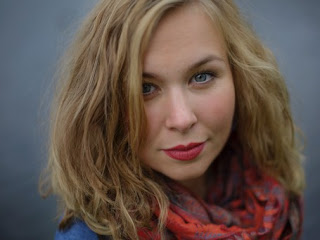That song was a taster for the newly-released EP, 'Rota Fortunae I'. ('Rota Fortunae II' will hopefully be with us later in the year. Since proceeds from the first part will help with further recordings, it's extremely important that you, and everyone you know, buy this EP as soon as possible!)
In case you missed that video first time round, here it is:
I think I have played that song pretty much daily since I first heard it. It lifts my spirits and fills any euphoria-shaped gap in my mindset.
I discovered Kate Arnold's music relatively recently, after seeing her play live amid line-ups featuring what I would call 'kindred spirit' musicians. I'm thinking of artists like Jo Quail and Sieben - both familiar to regular Specs readers (thank you, darlings, thank you) - who use various classical or acoustic instruments, combined with modern looping/electronic techniques to build up their own soundworlds. KA's weapons of choice are hammered dulcimer, violin, drum - and vocals.
Although an EP is, by definition, an all-too-brief experience, one of the great characteristics of 'Rota Fortunae I' is how it carefully, deliberately sets out Arnold's stall as an artist. On your first few plays, it will be enough to appreciate the gorgeous tunes, beautifully played and sung. However, if one of your chief joys when listening to a record longer-term is to focus intensely on various elements of the arrangement and production, marvelling at the precision with which it's been assembled - these 20 minutes are going to reward you for months, then years.
The opener, 'Skeleton Key' hardly features KA's voice at all. But as an introduction, it's perfect, as the near-instrumental really does provide a skeletal framework, using just the dulcimer to set up a series of percussive rattles, then gradually placing flesh on the bones with keening strings, layers of chiming melody, and - something of a trademark, this - a sudden 'shift' in the harmonies late on that pushes those euphoria buttons I alluded to earlier. In 'Skeleton Key', the single vocal line includes a soft hum that seems to come out of nowhere at first; then, as it reappears near the end, the full picture is revealed as it slots perfectly into the massed, looped chords.
We next hear the EP's only cover version, the comfortably out-of-copyright 'The Wind and I Must Sing', a composition from around 1180 by the troubadour Beatriz de Dia. Sung in Occitan (medieval French is another string to KA's crossbow), the otherworldly strains that open the track really do suggest that the tune has drifted down to us through the centuries. But seconds later, the song feels suddenly, thrillingly modern, with an insistent bassline cutting through the fractured swirls, and most important of all, an arresting and forthright vocal performance. KA makes Beatriz feel like an immediate, present personality, and you're conscious of how even something so stately and chant-like contains seeds of mélodie and chanson.
(Photography for CD inlay by Scott Brimley)
(Photography for CD inlay by Scott Brimley)
Hit single (in my universe anyway) 'For Barely One in a Thousand' follows, and brings together features from the previous two tracks - a pulsing bass note, with dulcimer and violin dancing round it, maintaining the tension through the first two verses. But the devil is in the detail - for example:
- The way the ascending violin line (starting around 0:40) keeps going behind the second verse (1:02 onwards);
- The layers of strings building to a two-chord mini-climax, celebrated with the first pound of the drum (2:04);
- 'Drop by drop', answered by a tiny cascade on the dulcimer (2:30);
- 2:37 to 2:47 - ten of the most impressive seconds of music I've heard in a long time; another of those shifts where the setting is 're-cast' so that each note of the verse line gets to 'resolve' one by one in a warm chord progression that somehow cycles back to the climax from the previous instrumental break.
Like I said, I've spent a long time listening to this tune. Not a wasted moment.
Finally, 'Fortune's Wheel' is perhaps the track where the versatility of KA's voice is shown to best effect, multiple Kates soaring above the minimum instrumentation, just about keeping them tethered. We almost hear lead and rhythm vocals, as chants and near-spoken rounds punctuate the sky-high longer melodies. Despite being a brand new work, it actually makes a perfect companion to 'The Wind and I Must Sing', blending a similar stateliness with confident, intimate vocals.
This is magical, magnificent, meticulous music, feeding the head while filling the heart.
Support the artist by buying the EP through Bandcamp here.
Finally, 'Fortune's Wheel' is perhaps the track where the versatility of KA's voice is shown to best effect, multiple Kates soaring above the minimum instrumentation, just about keeping them tethered. We almost hear lead and rhythm vocals, as chants and near-spoken rounds punctuate the sky-high longer melodies. Despite being a brand new work, it actually makes a perfect companion to 'The Wind and I Must Sing', blending a similar stateliness with confident, intimate vocals.
This is magical, magnificent, meticulous music, feeding the head while filling the heart.
Support the artist by buying the EP through Bandcamp here.




